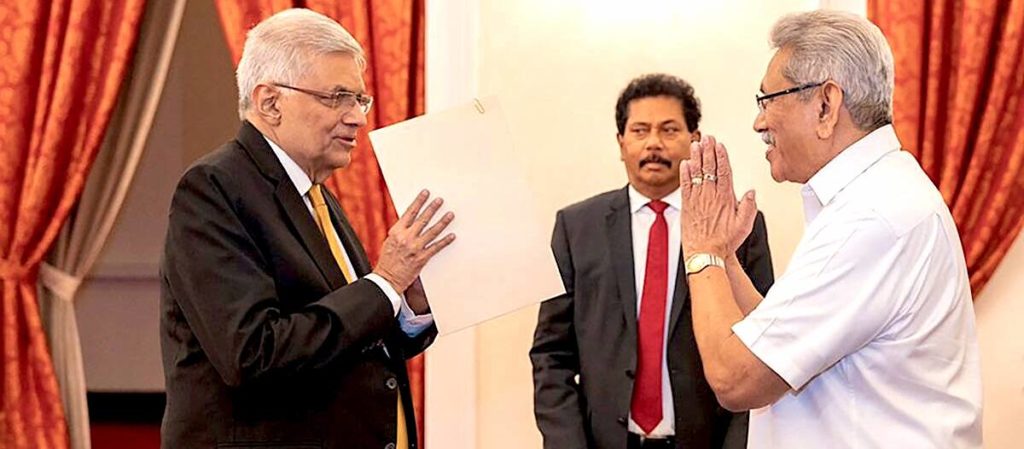Photo courtesy of The Indian Expresss
The president of Sri Lanka, sensing the serious frustration of the electorate at non-performance, sacks his prime minister and swears in another prime minister. The former prime minister was reinstated but even lost his own parliamentary seat at the subsequent elections one year on. No, not President Gotabaya Rajapaksa but President Maithripala Sirisena, who back in October 2018, sacked Ranil Wickremesinghe as prime minister and brought in Mahinda Rajapaksa for an infamous 52 day coup administration that was ended by the Supreme Court, which upheld the several no confidence motions passed by the then parliament.
Now in May 2022, the scenario is inverted as President Gotabaya Rajapaksa demands the resignation of his brother and installs Ranil Wickremesinghe again as Prime Minister for a record sixth term. In a multi-polar Sri Lankan polity of 2015 to 2018 that was Sirisena, Ranil and Mahinda, the calculation was that any two getting together could checkmate the other. The current calculation is that President Rajapaksa, with just a part of the Rajapaksa clan (Basil is backing the president) and Ranil, with very little support in the country, can hold at bay Sajith Premadasa and his SJB opposition front. Here are the reasons why Ranil’s own tenure as prime minister will likely be quite interim and his exit will signal the end of the Rajapaksa administration, which has completely lost its legitimacy in the eyes of the public.
The deal that Ranil cut
The recent farcical re-election of Ranjith Siyambalapitiya in parliament as deputy speaker demonstrated that the ruling SLPP, although discredited within the country, clearly held its numbers in the House. Somewhat reduced but still a majority. This then presented the opportunity for both the SLPP and Ranil. The SLPP could kick out its non-executive ceremonial prime minister while retaining executive authority through the 20th Amendment-strengthened presidency and create the window dressing of an ostensibly opposition or independent MP as prime minister. Ranil wanted a last hurrah before a retirement which he is determined will never come and was sworn in as prime minister, his UNP with one MP (himself), backed by the government group less most probably Maithripala Sirisena’s SLFP, which must be seething at not having the former president as the new prime minister.
The political instability would go on
Sri Lanka’s political crisis arises out of the near collapse of its economy, ironically from a president elected on a mandate of promising to provide vistas of prosperity and splendour. A government that so totally fails at the provision of basic services and even maintaining the existing economic wellbeing of the populace loses its political legitimacy. President Gotabaya Rajapaksa has lost all legitimacy in the country. His refusal to accept responsibility for a crisis resulting from his administration’s tax slashing, money printing and fertilizer banning is unconscionable and actually delays remedial measures and policy reforms. Several senior members of the clergy have already signaled their opposition to Ranil as prime minister. He is not a figure around whom people will coalesce, so it is doubtful if his cabinet will be inclusive and multi-party. The real problem for Ranil is he is being seen as prop, albeit a very weak one, for a widely discredited and now even reviled leader.
For the Rajapaksa clan, being united is critical to capturing or holding on to state power. The 2019 election victory was because the several brothers were able to iron out their differences, present a united front and win big. For the same reason, the divisions and discord within the famous political family is now on full display. Former Prime Minister Mahinda Rajapaksa, his sons and their backers believe with some justification that Mahinda, shorn of any executive power once he ceased to be finance minister in favor of younger sibling Basil, has been unfairly held responsible and thrown to the wolves as it were to assuage public anger caused by the president’s own policy blunders. After all the voodoo economics of tax slash, money print and ban chemical fertilizer all came from the president’s Viyathmaga and Eliya groups, ironically a path to destruction and darkness, the antithesis of their names.
The economic mess
The immediate socio-economic challenge is keeping basic public services and key utilities including fuel and electricity provided at the reduced rates instead of further cuts and reductions of supply. This also applies to gas, rice, other food staples including milk powder and medical supplies. Getting out of the economic mess requires the kind of fiscal overhaul that will entail significant and painful reforms that only a government elected and with a popular mandate can implement. If the ruling SLPP does not rescind the 20th Amendment, then this should be on the SJB manifesto and implemented within the first 100 days. If the president will not resign, the office must be made non-executive so he can serve out his term as a ceremonial president.
Meantime in the days ahead, parliament is due to vote on a motion of no confidence on the president and the new prime minister would also be required to demonstrate his majority or support in the House through the passage of a new budget. Earlier elites used to bristle when Sri Lanka was called a fragile state; now the voices on the street, in the aragalaya at Galle Face and elsewhere are saying much the same thing. An election will clear the decks and bring in both the political legitimacy, stability and policy reforms that are sorely needed. Replacing Mahinda with Ranil will not.
